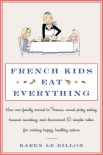French Kids Eat Everything Karen Billon (romance novel chinese novels txt) 📖

- Author: Karen Billon
Book online «French Kids Eat Everything Karen Billon (romance novel chinese novels txt) 📖». Author Karen Billon
Aha! I thought. For Americans, having lots of choices is synonymous with quality; it makes us happy. But for the French, choice doesn’t mean better quality—in fact, just the opposite. Too much choice is (potentially) a symptom of lower quality, which certainly wouldn’t make the French—who have such high standards for everything—very happy.
This new perspective on choice seemed to make sense. And that’s exactly what I told Sophie. “They’re only making one thing because they want it to be absolutely delicious. And it is!” I’d say firmly but cheerfully, as she balked every morning in front of the menu posted on the school door.
In addition to encouraging her to adapt, I also plotted to help her resist. But it wasn’t very successful. Secret snacks in Sophie’s pocket promptly resulted in a warning. So we found other strategies. We checked out the menus in advance and discussed them, so that Sophie at least wouldn’t be surprised by their appearance. And we started giving her bigger breakfasts to tide her over until lunchtime. We also asked one of the sympathetic servers to keep an eye out for Sophie. Initially suspicious, she soon warmed to her special duty (slipping Sophie extra pieces of bread if a meal looked like it was too much to handle). And we told Sophie to try to find a “buddy” to walk into the cantine with, to make lunchtime more bearable.
That is how Marie and her family entered our lives. Sophie and Marie started playing together in the playground after school, and I eventually worked up the courage to introduce myself to her dad, Eric. Our first few conversations were formal and polite, but upon learning that we lived just up the road, he immediately (and unusually, for a Frenchman) invited us over to their house, which turned out to be a small farm (the sort that is the envy of English tourists), with a sandy courtyard surrounded by long, low stone buildings covered with vines. Chickens, ducks, geese, and children roamed in the fields. The vegetable garden stretched down to a pond, around which Marie would ride her pony, Fastoche, after school.
In his day job, Eric was a carpenter. But his real calling was training horses for jumping competitions: the herd currently consisted of several fillies, a few foals, and a rambunctious stallion. Marie’s mom, Sandrine, was a nurse. On sick leave, but always smiling, she defiantly refused to wear a wig over the tufty thatch of hair that had stubbornly resisted her cancer treatment. We studiously avoided talking about her illness, and I wondered whether our arrival in the village was a relief: new faces, with no history.
Marie and Sophie would spend hours grooming Fastoche, wandering the fields, and running down to the sea and back. Sophie charmed the entire family with her stories (all entirely made up) about bears and wolves and whales back home. Marie became a regular visitor at our place, which helped give Sandrine some much-needed rest. The girls’ visits were a welcome distraction for everyone, and Marie and Sophie soon became best friends.
Reassured, Sophie finally began settling into school. It helped that her French speaking skills (like Claire’s) had improved dramatically. In fact, both of our daughters had almost forgotten how to speak English. This was partly our fault: to help the girls adjust, we had agreed to speak exclusively French to them. But this had worked better than we expected: by late fall, Claire refused to speak English (and scowled when I tried to speak it to her). Sophie wasn’t much better. One day, she innocently looked up at me and asked one of those questions that make you realize how young your children still are: “Maman, pourquoi on parle Anglais?” (Mommy, why do we speak English?). When she would consent to speak her native tongue, it came out with a strong French accent—she rolled her r’s—and she stumbled over her words.
Although things were better, they were far from perfect. Despite having made friends, Sophie still complained about the food at the cantine (although now she did it in French, which for some strange reason I found less irritating). Without fail, she would always tell me that she was affamé (starving) when I picked her up after school. Guiltily, I would stuff snacks into her as soon as she jumped in the car. French people, of course, don’t eat in their cars. So our crumb-filled backseat became a bit of an embarrassment (and, I suspect, the subject of scandalized village gossip). I would dart out of the classroom with Sophie, jog to the car, strap her in, and drive home. Not a great way to make friends with the other moms.
Still, by early November, Sophie had stopped crying in the mornings when I dropped her off at school. We had reached a new equilibrium, and I began to relax. But then we got our first dinner invitation.
4
L’art de la table
A Meal with Friends, and a Friendly Argument
La nourriture des enfants n’est pas un carburant.
Elle est constituée de culture, de paroles, et de plaisirs partagés non mesurables en même temps que de calories et de vitamines.
Children’s food is not fuel.
It is made up of intangible culture, words, and shared unquantifiable pleasures as much as calories and vitamins.
—Dr. Simone Gerber, French pediatrician
To understand why a simple dinner invitation could make me nervous, a bit of background is necessary. When we first moved to France, social gatherings involving food made me anxious, mostly because I was afraid that I’d have to eat new things in new ways. I might have to wield nutcrackers to extract every last bit





Comments (0)